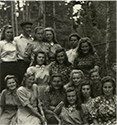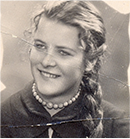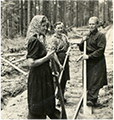#European Memories of the GuLag
This website expermiments with an alternative model of scholarly publishing, aimed at researchers, teachers, and the general public alike. A sort of “living book”, the proposed editorial format allows for regular updates on the progress of a research project.
Combining presentations intended for the general public with peer-reviewed academic contributions, the online publication is intended to provide both teaching material and discussion points for further research. Unlike publishing that presents a fixed state of knowledge, this dynamic form gives all users an insight of ongoing scholarship and reports on new approaches, including those that are still hypotheses subject to critical debate.
This online publication arises from a research project that began in 2007 on forced population transfer in Stalin’s Soviet Union. The research was supported by CERCEC (EHESS and CNRS), Radio France International and INED, and has collected more than 200 testimonies from former deportees to Gulag camps and Soviet “special settlement” villages, as well as photos, private and public archival material, and films. Many topics remain to be studied, particularly in relation to archives and testimonies collected by Russian, East and Central European institutions.

Editorial POLICY
Our aim in combining presentation for a general public and peer-reviewed scholarly contributions is both educational and as a basis for discussing further research. Unlike those publications that disseminate the state of accepted knowledge, this more dynamic form reveals science in progress for people from all backgrounds, reflecting new approaches, including hypotheses still open to criticism. All site content (presentation texts, research articles, sound and video archives, illustrations) is free to access. The publication is supervised by an international advisory committee and an editorial committee comprised of publishing and documentation professionals, as well as of French scholars specialized in this field of research. The review procedure for submissions as seen by the Editorial Committee is based on the standard practice of scholarly publishing, whereby each proposed contribution is submitted to two outside reviewers, specialists in that thematic field, whether geographical, historical, or methodological (peer review system).
The research PROJECT
The research project behind this platform, today backed by French National Institute for Demographic Studies (INED) and the Centre for Russian, Caucasian and Central European Studies (CERCES, EHESS/CNRS), addresses forced population transfer in the 20th century within the broad area of Eastern Europe and the Soviet Union. This took various forms of forced migration, depending on the period and official policies, with entire population groups leaving their homelands for forced residence or settlement in unknown territories.
The initial project, which involved conducting the first 160 interviews in 13 countries, led to the development of the virtual museum “Sound Archives: European Memories of the Gulag”, which constitutes the basis for the current website.
Legal FRAMEWORK
In the interests of transparency for users of the Publication, and in order to comply with the legal and regulatory requirements in force, INED has undertaken extensive work to ensure that the documents appearing in this publication can be used on a permanent basis. This page summarizes the basic legal principles governing the use of all reproduced contents.
A partnership with LA MARCHE DU MONDE (RFI)
The initial research project behind this publication was sponsored by the Centre d’études des mondes russes, caucasien et centre-européen (CERCEC, CNRS/EHESS, Paris), the French Institute for Demographic Studies (INED, Paris) and Radio France Internationale (RFI). This partnership led to a series of programmes for La Marche du monde produced by Valérie Nivelon (RFI) and the publication of a book and CD, Déportés en URSS: Récits d'Européens au Goulag (eds. Alain Blum, Marta Craveri and Valérie Nivelon, Paris, Editions Autrement, 2012, 311 p.)





